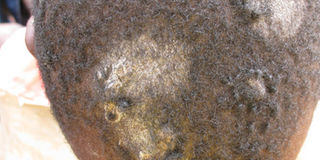How can I get rid of ringworm?

When ringworm affects the scalp, it creates patches of dry bald skin. The hair becomes brittle and breaks off. FILE PHOTO
What you need to know:
Ringworm occurs when a type of fungus called tinea grows and multiplies on the skin. Some of the symptoms include itchy, red and scaly patches
Dear Doctor: I have had ringworm for more than 20 years. After using different creams and tablets to manage the condition, it disappears and later re-appears. Can I get rid of ringworm completely?
Harmony
Dear Harmony: Ringworm (tinea) is a contagious fungus infection of the skin, which affects mostly the scalp, torso (body including the groins), feet and nails. Fungi that live on humans and animals (sometimes soil) may cause infection to the different body parts.
People get ringworm through direct skin-to-skin contact with an infected person, pet or any surface or object such as bed sheet, hats or combs. Anyone can get ringworm, though children in schools (boarding) are most affected.
Though difficult to prevent, treatment of infected persons and pets reduces the likelihood of re-infection. Avoiding contact with infected persons and not sharing personal items such as clothes, combs, hats or socks and keeping public areas clean is crucial. In rare cases, ringworm can be spread to humans through contact with infected soil.
Although the condition can be treated using creams, in severe cases, drugs may be used. If the fungus persists or re-occurs, it means the treatment with drugs (which usually lasts six weeks) has not been completed or the preventive measures explained above have not been undertaken effectively.
Showering immediately after exercise, to prevent sweat from keeping on the skin and ensuring the body is dry before dressing may be necessary. If the fungus becomes resistant to drugs, seeking advise from a skin specialist who will properly diagnose the problem is recommended.
Many skin conditions may appear as ringworm and therefore be treated as such, but without much success. People with a weak immune system (such as those with diabetes or living with HIV and people on long term steroid treatment), those with an inherited skin condition called atopic dermatitis, (characterised by itchy, inflamed skin) are more susceptible to ringworm. Such people may easily be treated, but still get re-infected.




